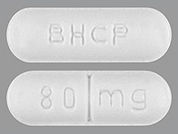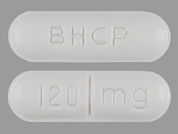See also Warning section.
Before taking sotalol, tell your doctor or pharmacist if you are allergic to it; or if you have any other allergies. This product may contain inactive ingredients, which can cause allergic reactions or other problems. Talk to your pharmacist for more details.
Before using this medication, tell your doctor or pharmacist your medical history, especially of: certain heart rhythm problems (such as a slow heartbeat, sick sinus syndrome, second- or third-degree atrioventricular block unless you have a heart pacemaker), kidney problems, heart problems (such as heart failure, recent heart attack), breathing problems (such as asthma, chronic bronchitis, emphysema), overactive thyroid disease (hyperthyroidism), serious allergic reactions needing treatment with epinephrine.
Sotalol may cause a condition that affects the heart rhythm (QT prolongation in the EKG). QT prolongation can rarely cause serious (rarely fatal) fast/irregular heartbeat and other symptoms (such as severe dizziness, fainting) that need medical attention right away.
The risk of QT prolongation may be increased if you have certain medical conditions or are taking other drugs that may cause QT prolongation. Before using sotalol, tell your doctor or pharmacist of all the drugs you take and if you have any of the following conditions: certain heart problems (QT prolongation in the EKG, history of torsade de pointes), family history of certain heart problems (QT prolongation in the EKG, sudden cardiac death).
Low levels of potassium or magnesium in the blood may also increase your risk of QT prolongation. This risk may increase if you use certain drugs (such as diuretics/"water pills"), if you are unable to eat or drink fluids as you normally would, or if you have conditions such as severe/prolonged sweating, diarrhea, or vomiting. Talk to your doctor about using sotalol safely.
This drug may make you dizzy. Alcohol or marijuana (cannabis) can make you more dizzy. Do not drive, use machinery, or do anything that needs alertness until you can do it safely. Limit alcoholic beverages. Talk to your doctor if you are using marijuana (cannabis).
Before having surgery, tell your doctor or dentist about all the products you use (including prescription drugs, nonprescription drugs, and herbal products).
This product may prevent the fast/pounding heartbeat you would usually feel when your blood sugar level falls too low (hypoglycemia). The risk is higher if you have diabetes, or are vomiting, fasting, or not eating regularly. Other symptoms of low blood sugar level, such as dizziness and sweating, are not affected by this drug.
If you have diabetes, this product may make it harder to control your blood sugar levels. Check your blood sugar levels regularly as directed by your doctor. Tell your doctor right away if you have symptoms of high blood sugar such as increased thirst/urination. Your doctor may need to adjust your diabetes medication, exercise program, or diet.
Children may be at greater risk for low blood sugar (hypoglycemia) while using this drug, especially if they are vomiting or not eating regularly. To help prevent low blood sugar, make sure children eat regularly. If your child cannot eat regularly, is vomiting, or has symptoms of low blood sugar (such as sweating, shaking), tell the doctor right away.
Older adults may be more sensitive to the side effects of this drug, especially dizziness, tiredness, and QT prolongation (see above).
During pregnancy, this medication should be used only when clearly needed. It may harm an unborn baby. Discuss the risks and benefits with your doctor.
This medication passes into breast milk and may have undesirable effects on a nursing infant. Consult your doctor before breastfeeding.


